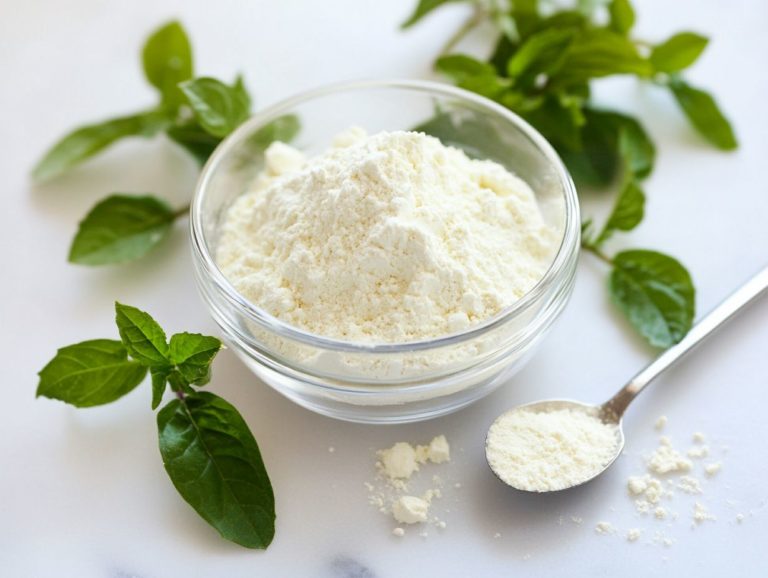5 Essential Supplements for a Healthy Heart
Maintaining heart health is essential for your overall well-being. The right supplements can significantly support cardiovascular function.
Discover five essential nutrients that can supercharge your heart health: Omega-3 fatty acids, Coenzyme Q10, magnesium, vitamin D, and L-Carnitine. You’ll learn their benefits, recommended dosages, potential side effects, and practical ways to incorporate them into your diet.
It will also highlight other important supplements and key factors to consider when choosing the best options for your heart.
Contents
- Key Takeaways:
- 1. Omega-3 Fatty Acids
- 2. Coenzyme Q10
- 3. Magnesium
- 4. Vitamin D
- 5. L-Carnitine
- What Are the Benefits of These Supplements for Heart Health?
- What Are the Recommended Dosages for These Supplements?
- What Are the Potential Side Effects of These Supplements?
- How Can These Supplements Be Incorporated Into a Healthy Diet?
- Are There Any Other Supplements That Can Benefit Heart Health?
- What Are the Key Factors to Consider When Choosing Supplements for Heart Health?
- Frequently Asked Questions
- What are the 5 essential supplements for a healthy heart?
- How do omega-3 fatty acids benefit heart health?
- What is the role of coenzyme Q10 in maintaining a healthy heart?
- How does magnesium contribute to a healthy heart?
- Why is vitamin D important for heart health?
- Can garlic supplements improve heart health?
Key Takeaways:

- Omega-3 fatty acids help reduce inflammation and lower the risk of heart disease.
- Coenzyme Q10 improves heart function and reduces the risk of heart failure.
- Magnesium lowers blood pressure and improves overall heart health.
- Vitamin D helps regulate blood pressure and supports cardiovascular health.
- L-Carnitine increases energy production in heart muscles and enhances heart function.
1. Omega-3 Fatty Acids
Omega-3 fatty acids are essential for promoting heart health and reducing the risk of cardiovascular disease. Think of them as vital allies in preventing chronic heart issues.
These fatty acids include healthy fats found in fish, particularly eicosapentaenoic acid (EPA) and docosahexaenoic acid (DHA). You ll find rich sources of EPA and DHA in fatty fish like salmon, mackerel, and sardines, as well as in algae-based supplements for a plant-based option.
Recent studies show that incorporating these omega-3s into your diet can significantly lower cholesterol levels, effectively reducing triglycerides and possibly decreasing arterial plaque build-up. The American Heart Association links regular consumption of omega-3s to improved cardiovascular outcomes, highlighting their crucial role in promoting heart health.
2. Coenzyme Q10
Coenzyme Q10 is a powerful antioxidant that supports energy production in heart cells and offers protective benefits against cardiovascular disease and heart issues.
This nutrient helps your heart pump blood efficiently and combats oxidative stress, which can lead to long-term damage. You can find Coenzyme Q10 in dietary sources such as fatty fish, organ meats, whole grains, and certain nuts, making it accessible through a balanced diet.
If you re considering supplements, ensure third-party verification to confirm the product’s purity and efficacy. A recommended daily dose typically ranges from 100 to 200 mg, but consult your healthcare provider first, especially since there may be potential interactions with medications like blood thinners and statins.
3. Magnesium
Magnesium plays a vital role in maintaining heart health. It helps regulate blood pressure and supports potassium intake, both crucial for normal heart function.
This remarkable mineral aids in muscle and nerve function and helps prevent heart disease by maintaining a steady heartbeat and promoting cardiovascular efficiency.
Dietary sources like spinach, almonds, and whole grains can help you meet your magnesium needs. If you struggle to get enough magnesium through your diet, consider supplements to fill those gaps and support your heart.
Most adults should aim for 310 to 420 mg of magnesium each day, depending on age and gender. However, consult a healthcare provider before starting any supplements, as excessive magnesium can lead to side effects like diarrhea, nausea, or serious heart complications.
Start incorporating these powerful nutrients into your diet today for better heart health! Consult your healthcare provider about these supplements or to begin integrating them into your daily routine.
4. Vitamin D

Vitamin D is gaining attention for its crucial role in heart health. It plays a supportive part in cardiovascular function and may lower the risk of chronic diseases, particularly cardiovascular disease.
Recent research highlights the necessity of maintaining adequate levels of this essential nutrient. You can find vitamin D in fatty fish, fortified dairy products, and sunlight. Sunlight boosts your body s production of this vital nutrient.
Studies show that people with lower vitamin D levels tend to be more susceptible to heart disease. This emphasizes the protective advantages of this nutrient.
If you find it challenging to get enough vitamin D through diet or sunlight exposure, supplementation might be a wise choice. Health experts recommend monitoring vitamin D levels to ensure optimal heart health.
5. L-Carnitine
L-Carnitine is an amino acid derivative that plays a vital role in heart function. It helps transport fatty acids to the energy-producing parts of cells, providing essential energy for heart cells and supporting overall cardiovascular health.
This crucial function in energy metabolism can be especially beneficial for those with heart disease, where efficient energy production is essential for optimal heart performance. By improving the heart’s ability to use fat as fuel, L-Carnitine can help alleviate heart disease symptoms and enhance your overall fitness levels.
If you’re considering increasing your intake, L-Carnitine is available in various forms, including dietary supplements. While there s no one-size-fits-all recommendation, many health guidelines suggest doses ranging from 500 to 2,000 mg per day, tailored to your health needs.
However, it s wise to watch for potential side effects, such as gastrointestinal discomfort or a higher risk of atherosclerosis in certain cases. Therefore, consulting a healthcare provider before starting supplementation is highly advisable.
What Are the Benefits of These Supplements for Heart Health?
The benefits of supplements like Omega-3 fatty acids, Coenzyme Q10, magnesium, vitamin D, and L-Carnitine for heart health are remarkable. These supplements work wonders for your heart! They help lower triglycerides and boost heart function, keeping chronic heart failure at bay.
These nutrients are vital to various physiological mechanisms that promote cardiovascular wellness. For example, Omega-3 fatty acids, primarily sourced from fish oil, are proven to reduce inflammation and lower blood pressure, as highlighted in a meta-analysis published in the Journal of the American College of Cardiology.
Coenzyme Q10 enhances mitochondrial function, potentially boosting energy production in heart cells, according to clinical nutritionists. In addition, magnesium supports healthy heart rhythms, while adequate vitamin D levels have been linked to a reduced risk of heart disease, as noted by renowned cardiologists.
L-Carnitine aids in fatty acid metabolism, providing extra energy for a well-functioning heart. Each of these supplements presents compelling evidence in support of heart health, making them essential components of a comprehensive approach to cardiovascular care.
Don’t wait! Start incorporating these essential supplements into your diet today for a healthier heart!
What Are the Recommended Dosages for These Supplements?
Recommended dosages for supplements like Omega-3 fatty acids, Coenzyme Q10, magnesium, vitamin D, and L-Carnitine vary based on your individual needs and health conditions. Consult with healthcare professionals to determine the right dosage for you.
For example, as an adult, you might typically need about 250-500 mg of Omega-3 per day. If you have specific health concerns, you may require a higher dosage.
Coenzyme Q10 generally falls within the range of 100-300 mg daily. This can be influenced by factors such as your age or any ongoing treatments.
Regarding magnesium, intake can vary widely. Recommendations usually hover around 310-420 mg for adults, depending on your dietary habits and personal requirements.
Vitamin D levels suggest a usual range of 600-800 IU daily. If you have a deficiency, you may need to increase that amount.
Lastly, L-Carnitine is often taken in doses of 500-2,000 mg per day. This is shaped by factors like your activity levels and overall health.
By considering these variables, you can tailor your supplement regimen to better align with your lifestyle.
What Are the Potential Side Effects of These Supplements?

While you might find that supplements like Omega-3 fatty acids, Coenzyme Q10, magnesium, vitamin D, and L-Carnitine boast impressive benefits for heart health, it’s important to be aware of potential side effects.
Common side effects can range from mild stomach upset and headaches to more serious reactions, such as allergic responses or interactions with prescription medications.
For example, Omega-3 fatty acids may leave you with a fishy aftertaste or even increase bleeding risk in some individuals. Taking too much magnesium might result in diarrhea or abdominal cramping.
Being aware of these risks is crucial. Always consider third-party verification to ensure supplement quality and efficacy.
If you’re thinking about adding these supplements to your routine, don’t wait! Talk to a healthcare provider today to ensure they align safely with your health needs.
How Can These Supplements Be Incorporated Into a Healthy Diet?
Incorporating supplements like Omega-3 fatty acids, vitamin D, and magnesium into your healthy diet can enhance their effectiveness. This ensures you achieve optimal nutrient intake for better heart health.
By pairing these supplements with nutrient-rich foods, you can adopt a holistic approach to wellness.
For instance, Omega-3s, which are abundant in fatty fish like salmon and walnuts, work best when accompanied by leafy greens rich in antioxidants.
Similarly, when you include vitamin D-rich sources, such as fortified dairy or eggs, alongside foods high in healthy fats, you’ll aid absorption and amplify cardiovascular benefits.
Magnesium, typically sourced from nuts, seeds, and whole grains, can further boost your heart health when enjoyed with colorful fruits and vegetables, creating a spectrum of nutrients that support overall cardiovascular function.
Are There Any Other Supplements That Can Benefit Heart Health?
In addition to Omega-3 fatty acids, Coenzyme Q10, and magnesium, consider other supplements like garlic, green tea, and fiber supplements. These can also provide significant benefits for heart health.
These supplements play a crucial role in a comprehensive heart-healthy regimen. For example, garlic can help lower blood pressure and cholesterol levels, effectively reducing the risk of coronary artery disease.
Green tea is rich in antioxidants, especially catechins, which may improve blood vessel function and enhance your overall cardiovascular health.
Meanwhile, adding fiber supplements to your diet can assist in lowering LDL cholesterol, further promoting a healthy heart.
When combined, these additional supplements complement the primary ones, creating a well-rounded approach to heart health and contributing to a lifestyle that supports your cardiovascular wellbeing.
What Are the Key Factors to Consider When Choosing Supplements for Heart Health?
When you re selecting supplements for heart health, it s vital to consider key factors like independent testing, dietary recommendations, and potential adverse effects to guarantee both safety and efficacy.
Sourcing quality ingredients is also crucial; where those ingredients come from can significantly influence their overall effectiveness.
Being able to read labels effectively gives you the power to identify not only active ingredients but also any additives and allergens that might pose a risk.
It s also important to recognize that different supplements can interact with medications or existing health conditions. This makes it essential to consult with healthcare professionals.
By discussing your options with a knowledgeable provider, you can customize your choices to fit your personal health needs. This ensures that the supplements you select genuinely support your heart health without any unintended consequences!
Frequently Asked Questions

What are the 5 essential supplements for a healthy heart?
The 5 must-have supplements for athletes include omega-3 fatty acids, coenzyme Q10 (a compound that helps produce energy in your heart cells), magnesium, vitamin D, and garlic.
How do omega-3 fatty acids benefit heart health?
Omega-3 fatty acids help reduce inflammation, lower triglyceride levels, and decrease the risk of heart disease and stroke.
What is the role of coenzyme Q10 in maintaining a healthy heart?
Coenzyme Q10 is essential for energy production in the cells of the heart, helps improve heart function, and reduces the risk of heart failure.
How does magnesium contribute to a healthy heart?
Magnesium helps regulate blood pressure, maintain a steady heart rhythm, and prevent artery calcification, which can lead to heart disease.
Why is vitamin D important for heart health?
Vitamin D helps regulate blood pressure, reduce inflammation, and improve blood vessel function, all of which can help prevent heart disease.
Can garlic supplements improve heart health?
Yes, garlic supplements can help lower cholesterol levels, reduce blood pressure, and decrease the risk of heart attacks and strokes!
Talk to your doctor today to find the best options for you!






